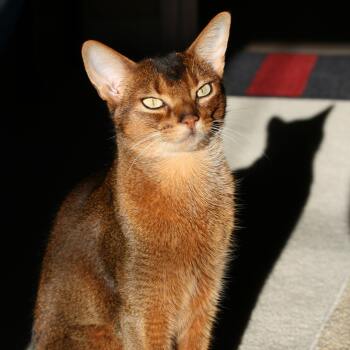Abyssinians

If you’ve welcomed an Abyssinian into your life—congratulations! You’ve brought home a lively, graceful, and endlessly curious companion. Known for their athleticism and inquisitive nature, Abyssinians, or “Abys,” don’t just live in your home—they explore every inch of it with enthusiasm.
What Makes Abyssinians So Special
Abyssinians are often described as little rays of sunshine thanks to their playful, social personalities. They thrive on interaction, whether it’s with people, other cats, or even friendly dogs. These cats love to perch high up, investigate every nook and cranny, and often follow their favorite people from room to room. They’re not big on cuddling, but they’ll show affection through gentle headbutts, chirps, and engaging play.
Their sleek, ticked coats and expressive eyes give them an exotic, regal look—many say they resemble cats from ancient Egyptian art. Smart, confident, and a bit mischievous, Abyssinians are perfect for households that enjoy a bit of feline entertainment and lots of interaction.
Things to Keep in Mind
Abys are high-energy cats who do best in active households. If left alone for long periods or without mental stimulation, they can become bored and may turn to mischief. Interactive toys, climbing towers, and even leash training can help keep them happy.
They’re also not ideal for small apartments unless you provide vertical space and plenty of enrichment. Their curiosity and fearless nature sometimes get them into trouble, so supervision and safe spaces are key.
Breed History and Fun Facts
Though their name suggests Ethiopian roots, Abyssinians likely originated from Southeast Asia and the Indian coast. They gained popularity in Europe in the 19th century and are now one of the oldest and most beloved cat breeds in the world. Known for their intelligence and unique coat pattern, they remain a favorite in both cat shows and homes.
Common Health Concerns for Abyssinians
While generally healthy, Abyssinians are prone to a few genetic and breed-specific conditions:
- Hypertrophic Cardiomyopathy (HCM) – A heart muscle condition that can develop silently. Regular checkups and early detection are key to managing symptoms.
- Progressive Retinal Atrophy (PRA) – A genetic condition that can lead to blindness. Genetic screening is recommended for breeding cats.
- Pyruvate Kinase Deficiency (PKD) – A hereditary form of anemia that affects red blood cell survival. A DNA test can determine if your cat is a carrier.
- Feline Lower Urinary Tract Disease (FLUTD) – Abyssinians may be more prone to urinary issues, which can cause straining, inappropriate urination, or discomfort.
- Amyloidosis – A protein buildup that can damage organs like the kidneys or liver. While not common, it is a concern in some lines of Abys.
- Cryptococcosis – A fungal infection more frequently seen in Abyssinians. Watch for signs like nasal discharge, lethargy, or weight loss.
- Gingivitis & Resorptive Lesions – Dental care is essential. Abys may be more prone to painful lesions that require extraction.
- Patellar Luxation & Hip Dysplasia – These orthopedic conditions are less common in cats than dogs but can still affect Abyssinians, especially as they age.
- Feline Hyperesthesia Syndrome – A neurological condition that causes extreme sensitivity and twitching, usually triggered by stress.
- Blood Type Concerns – Abyssinians often have type B blood, which is rare. Blood typing is crucial before any transfusions or breeding.
- Neonatal Isoerythrolysis (NI) – A risk when type B queens nurse type A kittens. Breeders should always test blood types to prevent this fatal reaction.
Ready to Learn More? We’re Here to Help!


